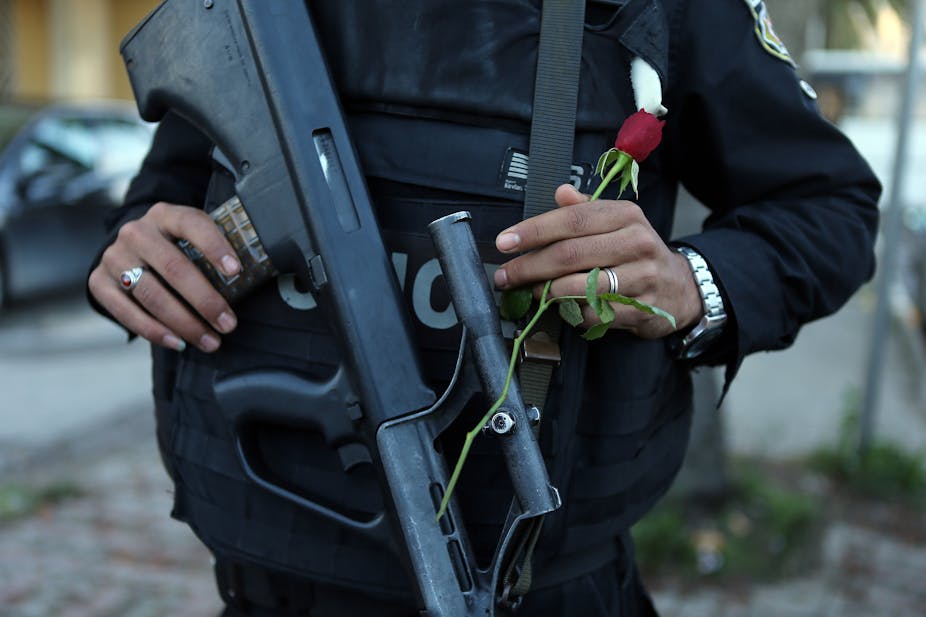A terrorist attack hit the heart of the city of Tunis last month, wounding nine people. The explosion struck Avenue Habib Bourguiba, the “Tunisian Whitehall”, when a female suicide bomber detonated herself near the Ministry of the Interior and the embassy of France, Tunisia’s former colonial ruler. The location, where modern and historic Tunisia meet, appears symbolic.
This latest atrocity follows several more deadly attacks, including the 2015 attack at Tunisia’s Bardo National Museum, which killed 24 and injured 45 others; the 2015 Sousse massacre, and the 2015 bus bombing which targeted presidential guards. These triggered a state of emergency that inflicted a severe blow to the country’s fragile democratic process.
But the most recent attack highlights the ongoing security situation that Tunisia and North Africa more generally now face. It demonstrates how the Tunisian security apparatus is increasingly incapable of effectively managing internal instability.
Democratic?
Following the toppling of dictator Zine El Abidine Ben Ali, Tunisia celebrated its first democratic elections in 2011, with the conservative-religious Ennahdha party emerging with 37.04% of the vote. But the transition to a stable democracy has been a difficult process with several incidents, such as the assassinations in 2013 of two important opposition leaders, Chokri Belaid and Mohamed Brahmi, jeopardising the process.
Despite this, in October 2014, the new Tunisian constitution was completed and the Tunisian parliament was elected. Two main currents emerged: the liberal movement, led by the Nidaa Tounès party, and the Islamist movement of the Ennahdha party.
But there are other powerful sociopolitical organisations to consider, too, including the various labour and professional unions that play a central role both economically and politically.
Over the past two years, another force has also appeared on the scene. Drumming up support via social media, as well as independent “old school” newspapers and radio broadcasts, this diverse group is fundamentally composed of young civil society activists, and has become extremely dynamic, especially regarding human rights.
They work individually or in small groups, and while they have not yet joined together into a traditional political movement, they form, as a whole, a rising force. Their influence was particularly evident in the May 2018 municipal elections, when independent candidates got more votes than either Nidaa Tounès and Ennahdha.
Political vacuum
Despite the evolution of democracy in Tunisia, recurrent government crises have left the country with a political vacuum. Indeed, the various political entities that now sit in parliament have been more concerned with consolidating their own power than agreeing on the nature and identity of a viable long-term regime. Perhaps unsurprisingly, the ruling Ennahdha party’s popularity is tumbling.
But the efficiency of Tunisia’s security apparatus has also been jeopardised by numerous recent reforms. Rather than being strategically implemented, these have been a series of ad hoc initiatives, representing certain vested interests. A recent International Crisis Group report describes the dismissals and appointments that have resulted as diminishing the integrity and professional skills of the country’s security personnel while weakening supervision and allowing petty corruption to flourish.
The Ministry of Interior, headed by Farhat Rajhi, initiated reform of the security apparatus in the immediate aftermath of the 2011 revolution, abolishing the once powerful Directorate of State Security and dismissing 42 high-level officials.

Similar decisions have also been taken by his successors. In short, there has been much change in recent years and political forces inside and around Tunisia are taking advantage of the situation. Bureaucratic delays and institutional competition from other arms of government – such as the economy, where public attention is more closely focused – have also compromised the country’ ability to secure itself.
Compromised
While the need for security reform was widely accepted in the immediate wake of the 2011 Tunisian uprising, the forerunner of the Arab Spring, it has now all but disappeared from public debate. Indeed, only after the assassinations of Chokri Belaid and Mohamed Brahmi, did public opinion briefly shift back to the topic. And so the status quo bumbles on, leaving Tunisia vulnerable.
A rare acknowledgement of the dire situation came recently from the minister of defence, Abdelkrim Zbidi. He affirmed that current political conflicts are responsible for 90% of Tunisia’s problems, including its failing security. It is a widely held view, which sounds rather like an ultimatum against the ruling class. The risk that the military might now intervene in some way has never been so real in Tunisia.
The Arab Spring seemed to change the face of North Africa for the better. But much remains unresolved and many areas are on the verge of collapse. In Libya, for example, after seven years of internal conflict following the Western military intervention and the toppling of Gaddafi, the lack of a stable government and the absence of border controls have destabilised the whole region – as well as many EU member states.
While the European Council finally recognised in 2015 that Europe should tackle this issue by working to stabilise the region, the EU still lacks a common agenda for managing the large immigration flows from North Africa or intervening more directly in the region’s problems. Indeed, North Africa’s regional chaos – and the consequent flow of refugees – have provoked an “existential crisis” in the EU, which is unlikely to end if stability in Tunisia and North Africa only glacially improves.
For now, Tunisia is on its own and struggling to fulfil the promise of the 2011 revolution. The country’s problems, however, could have repercussions that are felt across North Africa and Europe.

